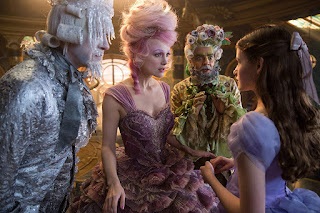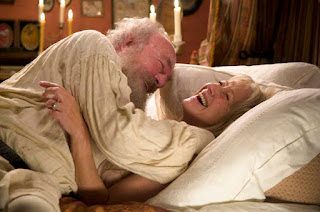The Nutcracker and the Four Realms
As sweet and insubstantial as the Sugar Plum Fairy’s pink cotton candy hair, The Nutcracker and the Four Realms is a confounding confection, full of pretty clothes, pretty music, pretty scenery, and pretty much nothing else. Loosely drawn from E. T. A. Hoffmann's short story "The Nutcracker and the Mouse King,” the film is a mashup began by original director Lasse Hallström and scriptwriter Ashleigh Powell, who later saw their work reworked and reshot by director Joe Johnston and writer Tom McCarthy. The messy result is a lot of ill-fitting parts connected only by James Newton Howard’s treacly score.
Still mourning the death of her mother, 14-year-old Clara Stahlbaum (Mackenzie Foy) is having trouble relating to her dour dad (Matthew Macfadyen) and embracing the upcoming yuletide season. Her mom posthumously gifts her a decorative egg that promises the solutions to all her problems, but it doesn’t come with the means to unlock it. Clara’s search for the key leads her down a rabbit, er, mouse hole, where she enters a parallel universe created and once ruled by her mother. Her search spans contrasting realms: the bright Land of Sweets, overseen by a gaggle of pixies headed by the Sugar Plum Fairy (Keira Knightley), and the adjoining, now-derelict Land of Amusements, ruled by the haggard Mother Ginger (Helen Mirren). Clara is aided by Philip, aka the Nutcracker, a character who never fully springs to life due to the affable, but otherwise languid acting of Jayden Fowora-Knight.
There are passing echoes of Tchaikovsky’s music, and American Ballet Theater star Misty Copeland and Ukrainian dancer Sergei Polunin occasionally appear to perform portions of Marius Petipa's ballet. But the throwaway plot invariably meanders back to Clara’s inconsequential quest, which smacks of Alice in Wonderland meets Tron: Legacy meets Narnia. The identity of the narrative’s true villain is a mystery to everyone in the Four Realms, even though events that apparently occurred prior to Clara’s arrival should have disclosed their true motives—indeed, an early encounter between Clara and Mother Ginger should, but doesn’t, clear up matters. The key itself is a bit of a MacGuffin whose only true function becomes enabling the antagonist, raising the question of why Clara’s dearly departed mom sent her to fetch it in the first place. The baddie has a ray gun that can transform opponents into toy dolls, and is then never used for that function.
Perhaps indicative of the crowded film production and some consequential slapdash editing, my eyebrows raised at Mr. Stahlbaum’s early, rather odd leering at his decked-out daughters. And then there’s the decision to cast Morgan Freeman, recently beset by allegations regarding his treatment of women, as Clara’s godfather Drosselmeyer, the creepy toymaker who waxes wistfully about Clara’s young mother once moving in to live with him.
Otherwise, The Nutcracker and the Four Realms is a banal snoozer, an early holiday Disney cash grab that mirrors a Christmas tree ornament: dainty, occasionally dazzling, and signifying little else.










